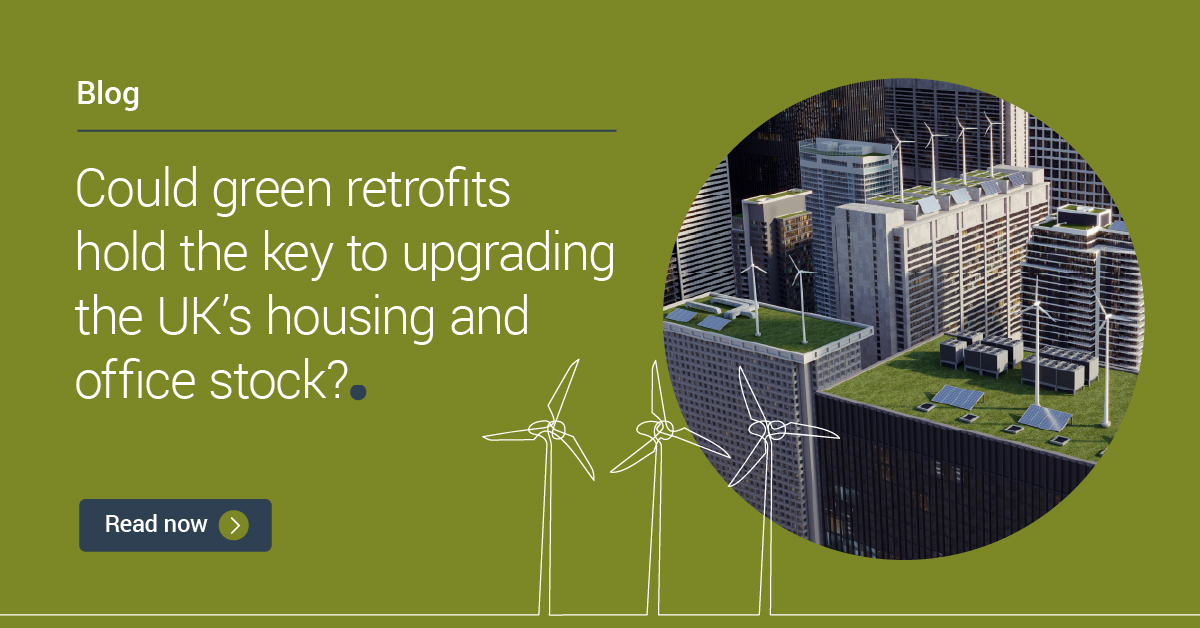Landmark’s Sustainability Blog 3 R&P Guide – Estate Agents: Could green retrofits hold the key to upgrading the UK’s housing and office stock?
In our latest report, Reflections and predictions for sustainability in the property sector in 2025, Landmark’s Sustainability Director Chris Loaring, spoke to a leading real estate agent for their views on decarbonisation, transitioning to sustainable offices and the need to retrofit to meet demand, and the shift from targets to reporting on progress.
As part of our market research report, Climate change in the property sector: a cross-market perspective, estate agents told us their clients showed a clear preference for green features when purchasing a new property, particularly insulation and energy performance (72%), homes built with sustainable materials (64%), and smart technology systems for energy saving (50%).
In our discussions with real estate agents, it was abundantly clear that green features may also shape the decision-making processes of clients in the commercial real estate market over the coming year. One source predicted that a growing demand for Grade A sustainable buildings could emerge, as people gain access to better data about their carbon footprint.
That could translate into higher demand for energy-efficient offices. As such, we might find a greater appetite for office moves to facilitate wider sustainability objectives. However, a major blocker will surely be the UK’s distinct lack of modern, Grade A office stock. In which case, could we see an uptick in proactive retrofits and greenfits to meet demand in 2025 and beyond?
Futureproofing UK property
It’s encouraging to hear reports of a growing appetite amongst residential and commercial clients for more energy-efficient homes and workspaces. Government initiatives like the Future Homes Standard, Warm Homes Plan, and Industrial Energy Transformation Fund (IETF) are all a step in the right direction for meeting demand.
We now need to see widespread take up of these types of incentives, and at scale, if we’re going to futureproof the country’s domestic and commercial properties. After all, our housing stock is amongst the least energy-efficient in Europe [1], and the UK Green Building Council estimates that the 77% of UK office stock with an EPC rating currently below B could become unlettable by 2030 [2].
That stark finding from the UKGBC is a prescient reminder that the clock is ticking on near-term net zero targets. It has become clear in our discussions about sustainability that the time for setting targets has largely passed. The narrative will now likely shift towards reporting on progress against sustainability targets – most notably the Paris Agreement’s 1.5C global warming limit.
Read our report
We believe that peer collaboration is essential to achieve sustainability targets. That’s why Landmark spoke to a panel of leading industry sustainability experts from Latham & Watkins, Taylor Wimpey, Savills, OSB Group, and our own Sustainability division to discuss the direction of travel for sustainability in the property market in 2025.
Read our report now: Reflections and predictions for sustainability in the property sector in 2025
Sources:
1 https://committees.parliament.uk/committee/664/energy-security-and-net-zero-committee/news/204117/how-do-we-retrofit-uk-homes-for-net-zero/
2 https://ukgbc.org/news/ukgbc-finds-significant-opportunities-being-missed-to-retrofit-commercial-buildings/
Kindly shared by Landmark



















